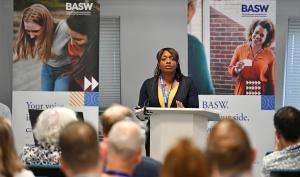Compassion and inclusion - what it means to be a leader in social work

Published by Professional Social Work magazine, 15 June, 2023
Social work leaders must create cultures where staff feel safe, valued and listened to rather than managed and controlled if the recruitment crisis in the sector is to be addressed.
That was the message from a plenary session exploring social work leadership at the start of BASW’s Annual Conference in Birmingham this week.
A panel of sector leaders highlighted what good leadership looks like - and some of the barriers to it being realised.
Tricia Pereira, director of operations for Skills for Care, the workforce development body for adult social care in England, called for humane leaders.
“Compassionate inclusive leadership is more than just a buzz word. The old 'command and control' approach is out. It is not fit for purpose anymore, the pandemic has shown that.
“And it has reinforced the importance of leading humanely and being more self-aware as leaders: including others in decision-making, not thinking as a leader you have to know the answer for everything. Showing that you are human is not a weakness.”
Pereira said high caseloads, stress, and the impact of moral injury and isolation due to remote working was leading to workers feeling burnt out, contributing to high vacancy rates.
“Workers are demanding change or simply walking away,” she said. “They are moving to agencies where they can experience more control around flexible ways of working, work that fits in with their lives and for many that includes increased hourly rates of pay.”
Research, however, shows that pay isn’t always as important for social workers as how they are treated and feel about their work, added Pereira.
“That is why inclusive leadership is important because research shows leaders and managers who are inclusive and compassionate have teams that are high performing.
“People want to be treated well and have a clear sense of purpose. They want to work where they feel trusted and can make mistakes and learn and grow from those mistakes rather than working in a toxic blame culture environment.”
Pereira said managers must lead “from the head and heart”, with a focus on the wellbeing of their team “without organisational egos getting in the way”.
“Leaders need to set an example so that colleagues can bring their authentic self to work.”
Calum Gallacher, assistant general secretary of the Social Workers Union, spoke out against “wellbeing washing” - where employers promote resilience through things like doing exercise.
This, he said, shifted the blame onto individual rather than organisational failings.
“Most social workers come to social work with adaptive resilience, which only develops more through the difficult experiences we have with the people we work with,” he said.
“So this is not a failure of any individual social worker to manage the complex, challenging experiences they face. But I do question if there is a failure in how leadership or organisational culture supports social workers to deal with that on a day-to-day basis.”
Gallacher blamed the “managerial culture that has infiltrated public services” for the recruitment and retention crisis in social work.
“There needs to be a change. Leadership should inspire confidence. People choose to follow leaders - management suggests more about constriction and control.”
He urged social work leaders to create “foundations for psychological safety” where everyone can ask questions, give opinions and contribute ideas “without fear of retribution”.
“The healthiest teams report the most problems. We need to acknowledge what the problems are. A key attribute to being a good leader is humility; knowing when you have done something wrong and being able to admit it and talk about.”
Professor Robin Miller, who lectures at the University of Birmingham’s School of Social Policy, highlighted some barriers to good leadership in social work.
“There are... conflicted ideas about what the purpose of social work is,” he said.
“Politicians and external partners see social work as being there to administer governmental policy in terms of trying to ensure resources are used in line with governmental priorities.
“There are also tensions about the role of social work – is it largely focused on working with individual people and families, or communities?”
Prof Miller said more support is needed to develop and support social workers leaders through their career across the UK.
Maura Dargan, executive director of social work for Northern Ireland’s Northern Trust, said social workers are natural leaders.
“Leadership qualities are essential for all social work roles… through the primary function of coordination,” she said.
“We all know of families in receipt of multiple services that are not doing well until social work steps in and with that coordination function.
“That coordinating role is just the same at board level, there’s nothing more to it. We have been a very long time training for these roles and we can move into these roles easier than our colleagues.”
However, Dargan warned “the hierarchy of social work management has the potential to stifle ideas and improvement”.
She said young people for whom work today was “as much about the experience of the job itself” would not tolerate poor working conditions and lack of career advancement.
“People in other careers are responding, health and social care is struggling to catch up.
“We need to articulate the core skill of social work in leading. We are falling behind professional colleagues. Doctors and nurses have leadership embedded in all they do. We don’t and we need to catch up.”
See full coverage of BASW's Annual Conference and AGM in the July edition of Professional Social Work magazine
